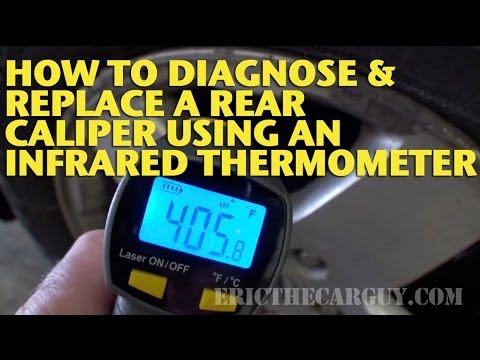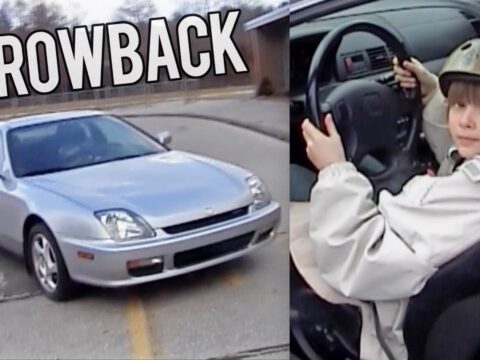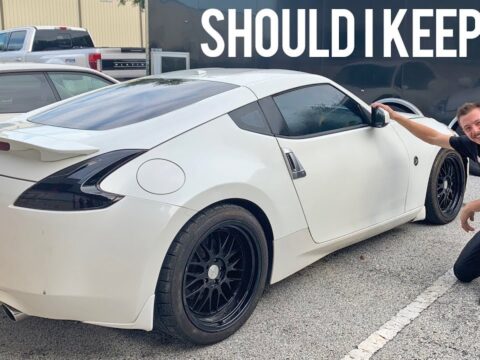How To Diagnose and Replace a Rear Caliper Using an Infrared Thermometer shows how to use an infrared thermometer to find a bad caliper. This method will also work on front calipers as well. Earlier this year ScannerDanner was visiting the shop and after we came back from a drive in my 2004 Honda Element, we smelled overheated brakes. The smell seemed to be coming from the right rear caliper. Upon further investigation, using an infrared thermometer, I found that that caliper had seized up and needed to be replaced. I’ve done brake videos like this in the past but never went through this particular diagnostic procedure to figure out what the issue was. It’s a method you can use for many other mechanical issues as temperature diagnosis is something that is used throughout the service and repair fields. It’s a fast and easy alternative to taking things apart for diagnosis. I hope it’s able to help you should you run into similar issues with your own vehicles.
The best place for answers to your automotive questions: http://www.ericthecarguy.com
Related videos.
How To Diagnose and Replace a Rear Caliper: https://www.youtube.com/watch?v=_UqTgYgd0Mk
How To Replace Rear Disc Brakes (Full Version): https://www.youtube.com/watch?v=3kf8C4Qxu-A
How To Spot and Service a Stuck Rear Caliper: https://www.youtube.com/watch?v=urK2EsZn4pQ
How To Replace Brake Fluid: https://www.youtube.com/watch?v=V5O_pbC8R2E
The Basics of Disc Brake Service: https://www.youtube.com/watch?v=cKpmBvfVYZg
Front Disc Brakes and How To Replace Them: https://www.youtube.com/watch?v=lAviOGXzEUk
How To Replace a Rear Caliper 1993 Acura Integra: https://www.youtube.com/watch?v=zaRgAvh0HhM
How To Replace Brake Hoses: https://www.youtube.com/watch?v=iE9LM1ppR6g
How To Bend and Flare Brake Lines: https://www.youtube.com/watch?v=bqyoTWFZ5K4
Tools.
Infrared Thermometer: http://www.jbtoolsales.com/general-tools-irt207-infrared-thermometer/#oid=1002_1
Hose pinching pliers: http://www.jbtoolsales.com/gearwrench-145-hose-pinch-0ff-pliers/#oid=1002_1
Impact Driver: http://www.jbtoolsales.com/otc-4608-3-8-impact-driver/#oid=1002_1
Dewalt 18v Impact: http://www.jbtoolsales.com/dewalt-dc823ka-3-8-18v-cordless-impact-wrench-kit/#oid=1002_1
Silicone Paste: http://www.jbtoolsales.com/3m-08946-silicone-paste-8-oz/#oid=1002_1
For other tools and deals check out the Tools page at EricTheCarGuy.com: http://www.ericthecarguy.com/tools
Related articles.
Brake Issues
http://www.ericthecarguy.com/faq/solving-brake-problems
Diagnosing Noises
http://www.ericthecarguy.com/faq/diagnosing-noises-in-your-car
Diagnosing Vibrations
http://www.ericthecarguy.com/faq/determining-the-causes-of-vehicle-vibrations
Performance issues
http://www.ericthecarguy.com/faq/solving-automotive-performance-issues
Buying a Used Car
http://www.ericthecarguy.com/faq/what-to-look-for-in-a-used-car-purchase
Leaks
http://www.ericthecarguy.com/faq/finding-and-fixing-leaks
Discussion about this Video: http://www.ericthecarguy.com/kunena/18-The-EricTheCarGuy-Video-Forum/52156-how-to-diagnose-brakeswith-an-infrared-thermometer#103210
The best place for answers to your automotive questions: http://www.ericthecarguy.com
ETCG FAQ Page: http://www.ericthecarguy.com/faq
EricTheCarGuy code lookup: http://www.ericthecarguy.com/obd-code-lookup
Facebook: https://www.facebook.com/EricTheCarGuy?fref=ts
Twitter: https://twitter.com/EricTheCarGuy
Google+: https://plus.google.com/100195180196698058780/posts
Information on Premium Membership: http://www.ericthecarguy.com/premium-content-streaming-etcg-content
Stay Dirty
ETCG
Due to factors beyond the control of EricTheCarGuy, it cannot guarantee against unauthorized modifications of this information, or improper use of this information.  EricTheCarGuy assumes no liability for property damage or injury incurred as a result of any of the information contained in this video. EricTheCarGuy recommends safe practices when working with power tools, automotive lifts, lifting tools, jack stands, electrical equipment, blunt instruments, chemicals, lubricants, or any other tools or equipment seen or implied in this video.  Due to factors beyond the control of EricTheCarGuy, no information contained in this video shall create any express or implied warranty or guarantee of any particular result. Any injury, damage or loss that may result from improper use of these tools, equipment, or the information contained in this video is the sole responsibility of the user and not EricTheCarGuy.





















Temperature is a valuable tool in diagnoses. Good video. BTW, I can tell this guy is intelligent by his vocabulary.
Nitrile gloves are the way to go when bleeding brakes. Brake fluid is bad shit for your skin.
I have developed a proven and zero cost method of diagnosing a dragging brake caliper or stuck wheel cylinder after many years of doing repairs, that is test drive the vehicle, park it and walk around the car and place your hand on each wheel near the wheel lugs and you can feel which one is hotter than the other. Simple and inexpensive.
I just tap the wheel with the back of my hand and I can tell which brakes are hot.
Yes, putting a little anti-seize on the bleeder screw threads prevents air ingress when bleeding the brake fluid. The bonus is that the bleeder screw will not get rusted up in the calliper; breaking the top off a rusted in bleeder screw can ruin your day. I never vacuum bleed, always pressure bleed using the brake pedal as it avoids possible air entry and it helps bed the brake shoes to the rotors.
I have little experience, but if I put too much lube on the sliding pin, with the rubber bushing, it would hydraulically lock up.
Although using a clamp to stop flow on the hose seems quick and easy, I would feel uncomfortable doing that on an old hose. Seems like if twisting the hose, or hanging the caliper by the hose would damage the hose, than pinching an old hose with a clamp would possibly damage the hose too. You could try to jam a short piece of rubber hose or a rubber-sleeved writing pen into the banjo bolt.
Just today I noted that my left-side brakes were MUCH hotter than the right. So I replaced the caliper on that side only. Then, after my test drive, the left side was much cooler than the right (right was about same temp as before). This told me the right side caliper had a problem as well, so I replaced it too. But I really didn't know that until after I had replaced the worst one. Best thing to do is to get a temperature reading when the car is new, or after you do a major brake overhaul so you know what the baseline is for future comparison.
Thx for the video Eric, have this issue on my 05 accord right now… smelt the brake burn, went back to take a sniff around the rear tires and voila…. could feel the intense heat and slight odor(Right side only). Here in Canada(Ontario), they charge us TAX(13%) on the core and then when we return the core…. we don't get the TAX back…..lovely!
Thanks again for the concise and well shot video, you are a gentleman and a scholar!
All in all a fine video. But i would strongly recommend using a stick or any other tool handy, to put pressure on the brakepedal and in that way prevent fluid running out. Brake hoses should not be clamped at any given point as it may result in the interior of the hose collapsing and you would have to redo the work you've just done.
Could be a collapsing hose?!
I cant begin to tell you how much more effective the Motive Brake Bleeders are than the vacuum/suction pump thing you are using is….great video though!
The same caliper is hanging up on my friends 03 element too… Hmmmm
Eric, although I realized auto mechanics wasn't a good career choice for me and gave up on schooling for it years ago, I just want to thank you for the fact that I have still had a lot of that education from you, and that it has helped me out on a number of occasions. How coincidental that just a few days ago I had rewatched your "diagnosing a bad caliper" video, and tonight I was able to diagnose, on the spot, that the sudden terrible burning odour from my mother's van that had come and gone a few times recently turned out to be the left rear caliper. I knew I bought that laser temperature reader for a reason.
This isn't the first time something I've learned from you has led me to solving a problem, and I've meant to write a message like this to you for a while now, but tonight was the reminder I needed. You may never get to reading this, but I still wanted to float it out there.
Thanks for the education. I may not have made a career out of it like I once planned, but it has helped me out more than once and it has given me the belief that with a lot of training, time, and patience (my biggest enemy right there), I might have made an adequate mechanic.
I hope to make it to next year's meetup to shake your hand.
Cheers,
Adam H.
It's an awesome channel, I'm watching your amazing videos here in Brazil and I'm loving each one of them you already got a new subscriber.
Also, when bleeding the brakes you should do the farthest one from the master cylinder first or air can be trapped between the "t" and the caliper on the long side. Especially if the "t" isn't in the center of the axle.
could of also been a collapsed flex line. should have  undone bleeder and then try and compress.ÂÂ
OK
copper washers or orginal washers are a soft metal and when you compress then again they will take the new shape, nothing wrong with it, done it more then once^^
I love new rotors!
I have a 2011 caravan with 27k. at about 23k the rear drivers brakes were burning. I took everything apart and lubricated and removed rust. Today they were howling and overheating again, when you stepped on brakes noise stopped,numerous posts on internet about this but nobody seems to know what the answer is. your thoughts?
 Do one side, you do the other problem or not..
hey eric, i have a 1977 buick lesabre with brake issues. Ive replaced the brake booster, master cylinder, bench bled it as well as while on the car. bled the complete system at least 3 times. I have firm brakes when the car is off, but soon as i start the car i have no front brakes. Could the hoses from the front calipers to the main line be bad/clogged? all help is welcomed, as i would like to be able to sort this out and drive the car again.
My brakes pads always look like that but nothing is wrong with my brakes … apparently I'm just too hard on the brakes !
Thanks Eric.  That was quite clear and informative.  You mentioned not to use anti-sieze on the caliper slides.  what if you did?…
I just happened to notice, I don't know if you did but to me it looked like you didn't torque down the upper fastener on that calipher and only the lower one, drive safe!
If you don't have rotor hat screws to hold it against the hub while you assemble the caliper, you can always spin a couple lug nuts on to hold it in place until you're done servicing the caliper/pads.
If you don't have rotor hat screws to hold it against the hub while you assemble the caliper, you can always spin a couple lug nuts on to hold it in place until you're done servicing the caliper/pads.
helpful hint. if caliper does not compress, open bleeder and try again to confirm caliper is at fault and not brake hose. a restricted brake hose could cause the same problem. have seen hose brackets rust so bad that they crush the hose and restrict flow. Prying open a rusty hose bracket and retesting could confirm if hose bracket is the fault. Hose should still be replaced for Safety if rusty hose bracket is the cause.
I knew which one of mine was bad, it was smoking 😛
When I bleed brakes now I use a powerbleeder. Its a great tool. I had to swap a rear caliper on my buick lacrosse (W Body) and used a powerbleeder on my car, bleed out all 4 wheels to change my fluid out, took 30 minutes, beautiful tool.